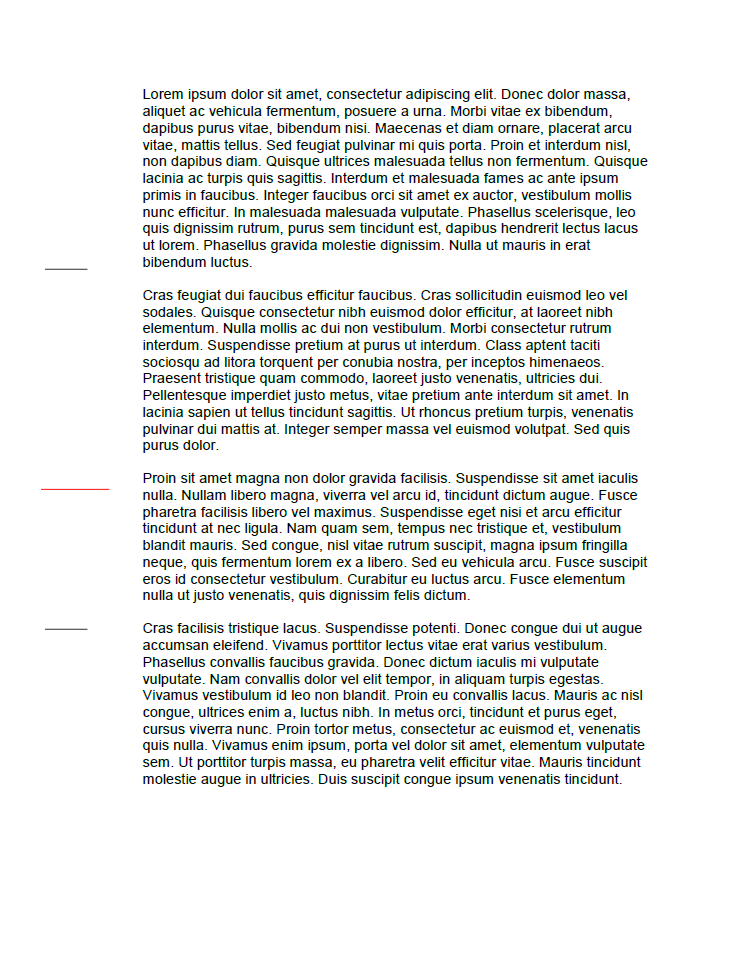Adding Fold Marks and Punch Marks to Documents using Drawings in C#
This article shows how to add fold marks and punch marks to documents using drawings in C#. The sample shows how to create a drawing with fold marks and punch marks and how to add this drawing to a document.

Especially important for letters that need to fit into standard envelopes, fold marks are guidelines that help you fold documents accurately. DIN 5008:2011 is a German standard ("Falzmarken") that provides guidelines for document layout and formatting. These marks are used to ensure that when a document is folded, the text will remain in alignment and will fit properly in a standard DL envelope (220 x 110 mm).
Inserting Drawings
To create these marks, you can use the drawing feature of TX Text Control and insert these marks in the header to position them behind the text, overlapping the left margin. The following code shows how to create these fold marks using TX Text Control:
private void InsertFoldingMark(double top, int width, Color color, HeaderFooter headerFooter, TextControl textControl)
{
textControl.PageUnit = MeasuringUnit.Twips;
// create a new drawing control
TXTextControl.Drawing.TXDrawingControl drawing =
new TXTextControl.Drawing.TXDrawingControl(3000, 1000);
// create a new line shape object
TXTextControl.Drawing.Shape shape =
new TXTextControl.Drawing.Shape(TXTextControl.Drawing.ShapeType.Line);
// set the color and border width
shape.ShapeOutline.Color = color;
shape.ShapeOutline.Width = 20;
shape.Angle = -45;
shape.Movable = false;
shape.Sizable = false;
// add the shape to the drawing control
drawing.Shapes.Add(
shape,
TXTextControl.Drawing.ShapeCollection.AddStyle.Fill);
shape.Size = new Size(width, width);
// create a new drawing frame object from the created drawing control
TXTextControl.DataVisualization.DrawingFrame frame =
new TXTextControl.DataVisualization.DrawingFrame(drawing);
frame.Sizeable = false;
frame.Moveable = false;
var leftOffset = textControl.Sections[headerFooter.Section].Format.PageMargins.Left - MmToTwips(12);
var topOffset = textControl.Sections[headerFooter.Section].Format.PageMargins.Top;
// add the frame to the document
headerFooter.Drawings.Add(
frame,
new Point(-(int)leftOffset,
(int)(MmToTwips(top) - topOffset)),
FrameInsertionMode.BelowTheText | FrameInsertionMode.FixedOnPage);
}
public static double MmToTwips(double mm)
{
const double mmPerInch = 25.4;
const double twipsPerInch = 1440;
double inches = mm / mmPerInch;
double twips = inches * twipsPerInch;
return twips;
}The above function can be called to insert the two typical fold marks and a punch mark:
textControl1.Sections.GetItem().HeadersAndFooters.Add(HeaderFooterType.Header);
HeaderFooter header = textControl1.Sections.GetItem().HeadersAndFooters.GetItem(HeaderFooterType.Header);
// folding mark 1
InsertFoldingMark(87, 500, Color.Black, header, textControl1);
// folding mark 2
InsertFoldingMark(192, 500, Color.Black, header, textControl1);
// punch hole center mark
InsertFoldingMark(148.5, 800, Color.Red, header, textControl1);These fold marks are inserted into the header of the document. The resulting document looks like this:

Conclusion
Using TX Text Control, you can easily create fold marks for your documents. These marks are especially useful for letters that need to be folded and inserted into standard envelopes. The fold marks are inserted into the header of the document and are positioned behind the text, overlapping the left margin.
ASP.NET
Integrate document processing into your applications to create documents such as PDFs and MS Word documents, including client-side document editing, viewing, and electronic signatures.
- Angular
- Blazor
- React
- JavaScript
- ASP.NET MVC, ASP.NET Core, and WebForms
Related Posts
ASP.NETASP.NET CoreInline Styling
RegEx Based Inline Styling in TX Text Control Using JSON Rules
In this article, we demonstrate how to apply inline styling to text in TX Text Control using regular expressions defined in JSON format. This approach allows for dynamic and flexible text…
Convert CSV to PDF in .NET C#
Learn how to convert CSV data to a table in C# using the ServerTextControl library with this step-by-step tutorial. Easily generate PDF documents from CSV files in your .NET applications.
5 Document Workflows You Can Automate With JavaScript Rich Text Editor
Enterprise JavaScript rich text editors outperform open source and basic alternatives for document automation. This guide covers five document workflows with TX Text Control: contract generation…
AI-Ready Legal Documents: What to Fix Before Adding AI
Summerization, analysis, and risk detection: AI can help legal professionals process documents faster and more efficiently. However, before integrating AI into your legal document workflows, it's…
Explaining Contract Tracked Changes Automatically Using .NET C# and AI
Learn how to use AI and .NET C# to automatically explain changes to contracts, improving the document review and collaboration processes. This comprehensive guide provides practical implementation…






